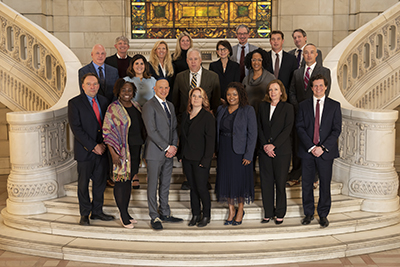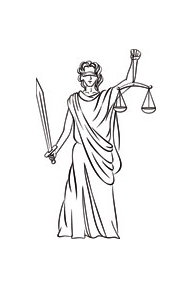Magistrates
 Magistrates are judicial officers who assist courts of record. They handle a wide array of cases and have a broad range of responsibilities.
Magistrates are judicial officers who assist courts of record. They handle a wide array of cases and have a broad range of responsibilities.
The Magistrates of the Cuyahoga County Domestic Relations Court are organized into special dockets according to the nature of cases assigned.
Trial Magistrates conduct divorce trials. Motion Magistrates conduct hearings on matters brought before the Court on a range of issues after a marriage has been terminated. Support Magistrates conduct hearings on spousal support and child support matters related to marriage termination and interstate (U.I.F.S.A.) cases. Domestic violence Magistrates conduct trials exclusively in domestic violence cases.
One Trial and one Motion Magistrate are assigned to each Judge. Support Magistrates and Domestic Violence Magistrates handle cases assigned to all of the Court’s five Judges.
To be eligible to be appointed as a Magistrate in the Cuyahoga County Domestic Relations Court, an individual must:
- have been engaged in the practice of law for at least four yours;
- be in good standing with the Supreme Court of Ohio at the time of appointment; and
- be determined by the Administrative Judge to be competent to perform the duties of the office.
Subject to the terms of reference, Cuyahoga County Domestic Relations Magistrates have the authority to:
- Determine any motion in any case;
- Conduct the trial of any case;
- Conduct proceedings upon application for the issuance of a temporary protection order as authorized by law; and
- Exercise any other authority specifically vested in magistrates by statute and consistent with Ohio Civil Rule 53, except that magistrates do not have the powers to issue arrest warrants or the power to issue temporary restraining orders.
In performing their responsibilities, magistrates are authorized to regulate all proceedings as if by the court and to do everything necessary for the efficient performance of those responsibilities, including:
- Issuing subpoenas for the attendance of witnesses and the production of evidence;
- Ruling upon the admissibility of evidence;
- Putting witnesses under oath and examining them;
- Calling the parties to the action and examining them under oath;
- Imposing, subject to Civ. R. 53(D)(8), appropriate sanctions for civil or criminal contempt committed in the presence of the magistrate.
Trial Magistrates are located on the third floor. Motion Magistrates are located on the first floor. Support Magistrates and Domestic Violence Magistrates are located on the ground floor.
Trial Magistrates


For Judge Diane M. Palos


For Judge Tonya R. Jones


For Judge Francine B. Goldberg


For Judge Leslie Ann Celebrezze


For Judge Colleen Ann Reali
Motion Magistrates


For Judge Diane M. Palos


For Judge Tonya R. Jones


For Judge Francine B. Goldberg


For Judge Leslie Ann Celebrezze


For Judge Colleen Ann Reali
Support Magistrates














Domestic Violence Magistrates





